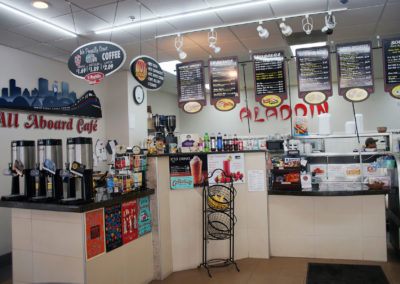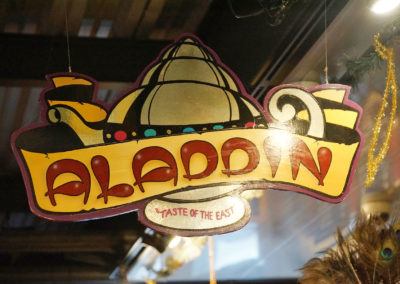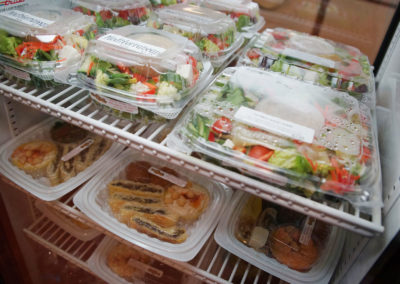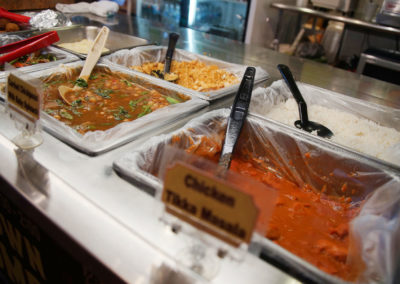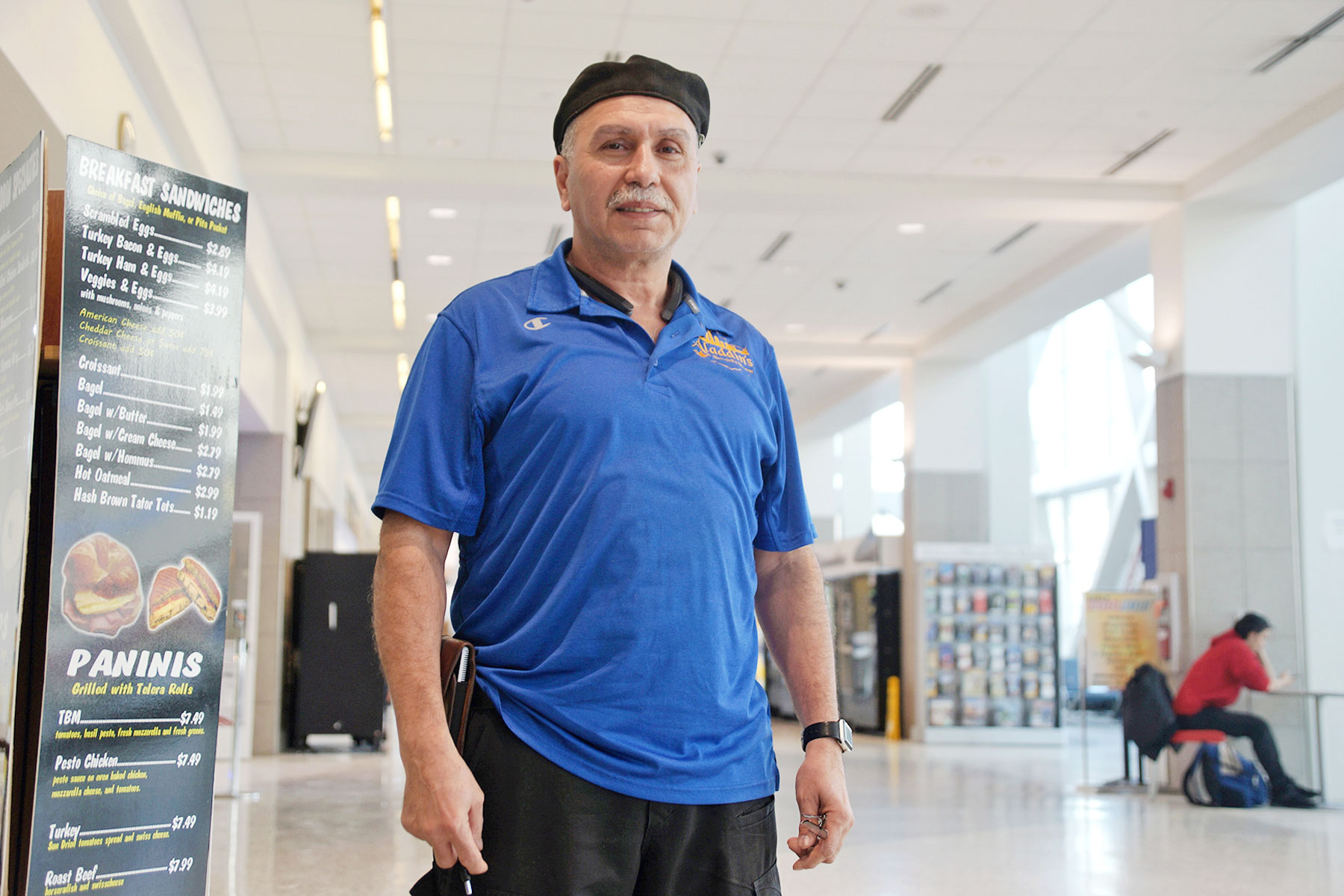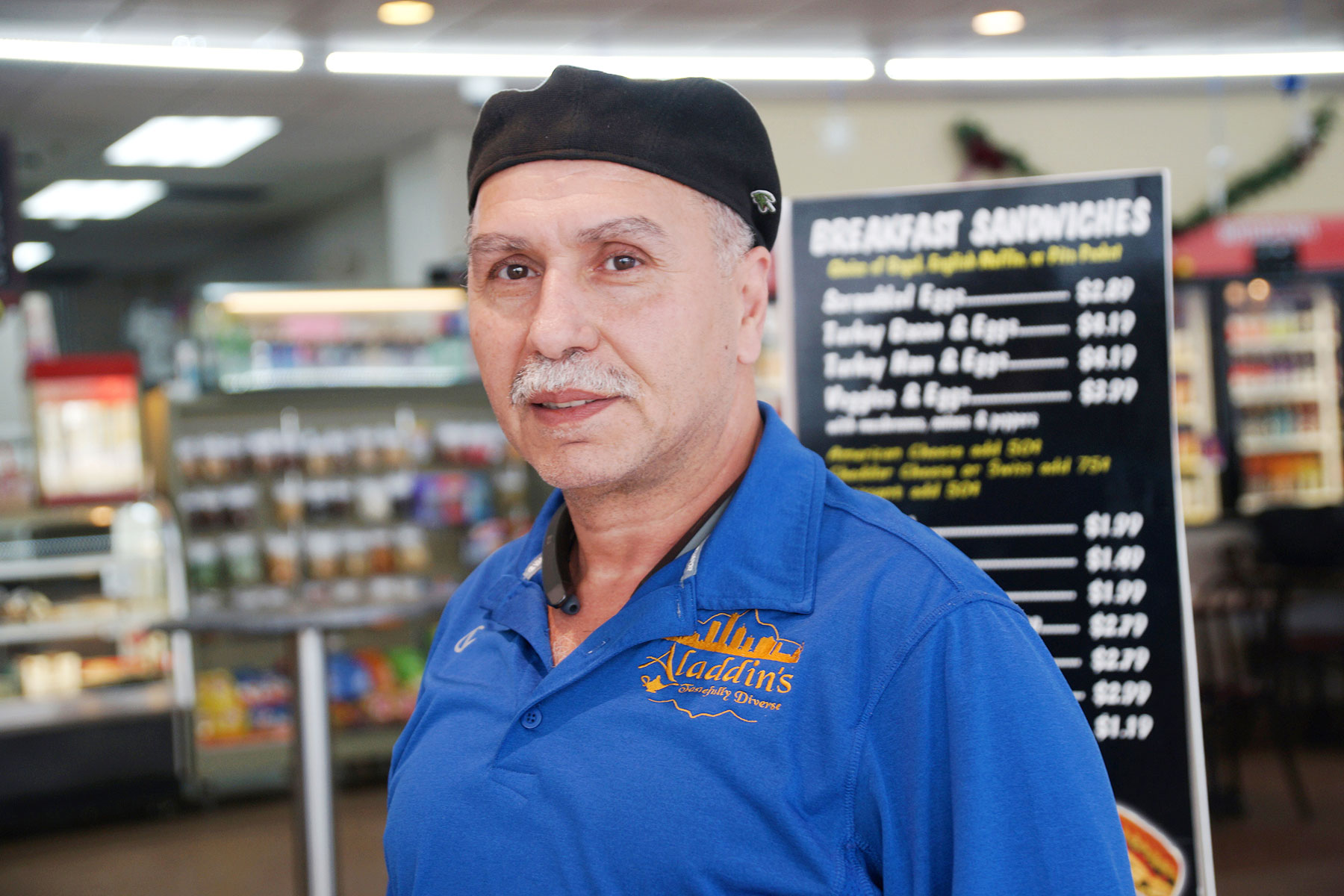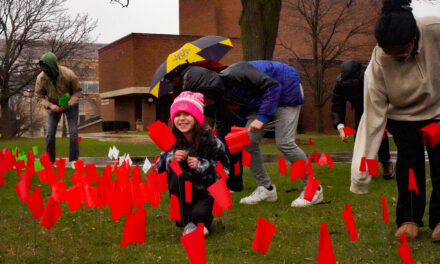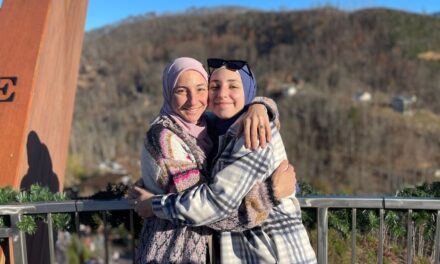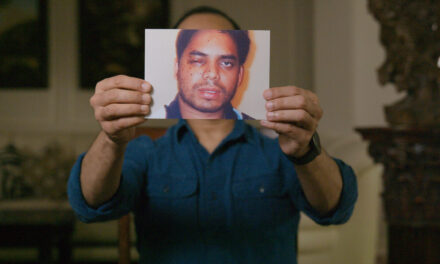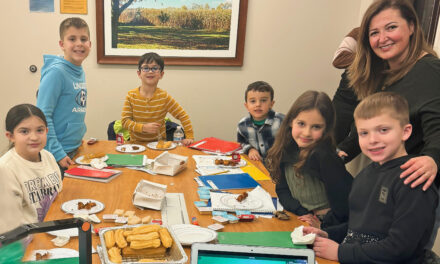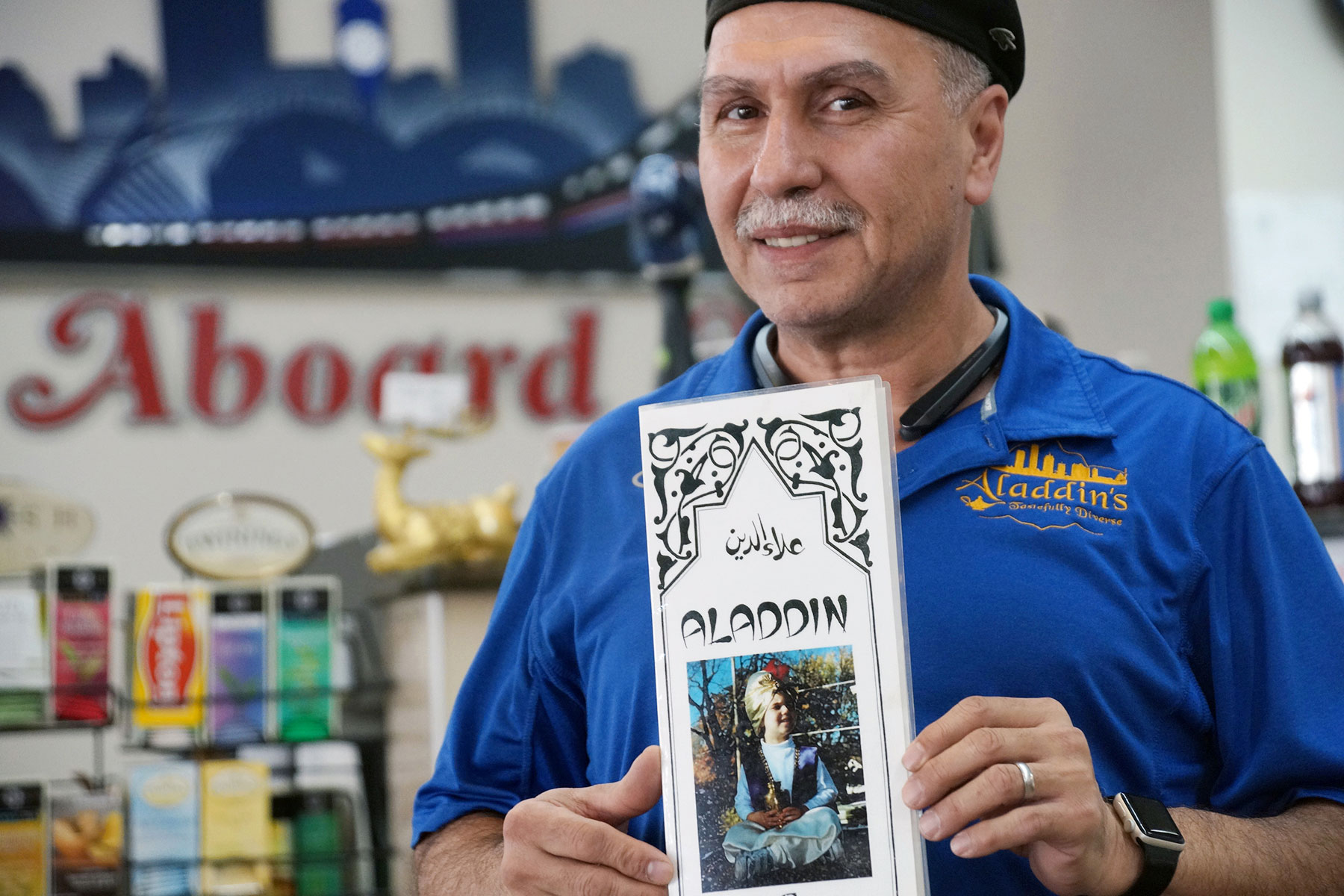
Aladdin is a transliteration for Alāʾ Ad-Dīn, meaning “holder of the faith” and the family name of Azmi Alaeddin (Ala ed-din). For the longtime Milwaukee resident, his Palestinian ties are interwoven with his life and work, combining a deep sense of duty to the community across generations with a passion for the culinary arts. Alaeddin’s restaurant business is acknowledged to be a local success and an example for others, but at the center of all his decisions as a single parent was the wellbeing and care for his only son.
Q&A: Azmi Alaeddin
WMJ: Where did you grow up and what do you remember most about your youth?
Azmi Alaeddin: I was born in Palestine, in the old city of Jerusalem. When I was a couple of years old we moved to Kuwait, that was where my father was working. There were lots of Palestinians in the Gulf during that time. The occupation by Israel pushed lots of Palestinians out. Some of them were like my father. He lived there originally to support our family financially, so we could stay in Jerusalem. But eventually I grew up in Kuwait, unfortunately we Palestinians did not have a sense of community in Kuwait. My father had a little network of friends around my him, but people were there to work and provide for their family. That did not leave time for anything else.
My father was a blacksmith in Kuwait and had a small construction company. At the same time, he had an investment in a bakery and an ice cream shop. So as a young man, I had the choice of going work in the bakery or going into construction. The bakery was more fun and cleaner. For some reason I developed the habit of sneaking back in the kitchen to help out, and I learned a lot. But it was not my idea to do it for life, because I wanted to come to the United States to get my education.
Palestinians in that era of the 1960s and 1970s, every parent made sure that their children were educated. I remember that we were under occupation and my father would say ‘your enemy could take your freedom, could take your land, could take your money, but they cannot take your knowledge.’ That was his attitude. Even though my father never finished high school, he felt that all his kids had to go to college.
I believe it was same goal in life for most Palestinians. But after we got an education, we needed ways to make money. Palestinians feel a deep responsibility for the rest of the family. So there is pressure to get a career in engineering, accounting, computer science, or something professional to make more money faster to send back and help family. Our friends in Kuwait could hardly make a living there, but they still sent their children to the United States. So Palestinians who came over then were well educated, and they were driven to pay back that education.
WMJ: What was the transition like from Kuwait to America, and did you experience the same kind of social isolation?
Azmi Alaeddin: Actually, I would not say America is an isolated community at all. It is sad to talk about Kuwait, and I know that some Kuwaitis do not like to hear this, but it is a fact. They looked at Palestinians like we were there for nothing but work, because we came there to do a job and that was it. For all the years I lived there, I never had a Kuwaiti friend. That was sad, really sad. There was a big gap between us and them. We lived in different part of the town. We were in apartments, they were in houses. That gap always stayed between us.
But when I came here, although I did not grow up in America I had American friends within a few months. As a matter of fact, after all these years I am still close to one of my first American friends and now she is a grandma. We were friends before she got married, before I even had a restaurant. I cooked for her wedding.
America is different. Here I was welcomed. There was no barrier between me and Americans, they gave me respect. But in Kuwait we could never be equals. That caused a struggle for me with my father. After I finished college he wanted me to come back. But I did not want to, my life had changed. I could not follow the path that he took, and endure what he did with the Kuwaitis. There was no way.
In America, I felt like a human being and I had an opportunity. All that I had to do was just obey the law, respect everybody, and everybody will give me respect. I can just be who I am. I knew I could do in a few years what it took my father his entire life to accomplish over there. Thankfully my sister was already here and working on her citizenship, so it became easier to eventually bring my father and family to America.
WMJ: So what was Milwaukee like in the 1980s? And like for you in the Muslim community?
Azmi Alaeddin: Milwaukee in 1980, you would not say “Muslim Community.” You would say “Arab Community.” There was an Arab community, with Arab and Palestinian students. Having an Islamic identity as a Muslim did not come until the late 1980s. I remember we had two student organizations at UW-Milwaukee, one called the Organization of Arab Student and the second one, the General Union of Palestinian Students. The Muslim Student Association (MSA), did not start util 1988 or 1989 at UWM. We were more politically involved than focused on Islam. We were concerned about the conflict between Israel and Palestine or the issues of Palestinian people, that was our goal at the time.
WMJ: How do you identify yourself? Are you first a Palestinian, or an Arab, or Muslim, or are the distinctions inseparable?
Azmi Alaeddin: I am a Muslim. Above all else, I am a Muslim. I do connect with other Muslims but not as deep, to be honest, as with Palestinians. Sometimes it is due to the language, or the customs. I feel we are very close with the Pakistani community, which is the second largest Muslim community in Milwaukee. But they speak Urdu and not Arabic. So we are good friends with them, but we do not get to visit each other as frequently outside of the Islamic Center itself. That place has really helped to unite us. Otherwise, Arab countries tend to have more in common with each other, especially on issues of Palestine. So we find ourselves meeting or going to each other’s houses more often.
WMJ: What does the Islamic Center of Milwaukee (ISM) mean to you, and how important is it to the community?
Azmi Alaeddin: The Islamic Center is extremely important for every Muslim in Milwaukee. My attachment to the Islamic Center originally came through being an activist. I was close to the families heavily involved with its founding. I had a friend here who was Palestinian, but he was isolated and maybe I was his only friend. So when he died, he had no family at all. But the Islamic Center picked up his body and prepared him as a Muslim for burial, and buried him, covering all the costs. I remembered thinking that day that eventually I would leave this life too, so I would rather be a guest at ISM than a stranger. That was in 1988 and I have been a member since that day.
I believe having a community is extremely important for an individual. And when we grow up and have a family, it is a good atmosphere for children. I believe parents can teach their kids lots of things. But when we cannot, then that environment is where we can find all kinds of support. Some children try to avoid speaking Arabic, because the other kids in public schools think it sounds funny. But at Salam school at ISM, kids see that lot of other students speak like them so they feel it is normal.
WMJ: When you look back at your relationship with your father, how do you compare that with your relationship to your son?
Azmi Alaeddin: It was way different over there. The father was the father, and he could do no wrong. I knew my parents loved us dearly because of the things they did. They never said ‘I love you,’ but I think they did offer much more than love. Maybe sometimes when I was growing up it was hard to see all the little things my father did for me. But as an adult I looked back and knew that what he did was out of real love. My parents gave up everything so we could be here.
But here in America it is a little different, because we have to show it, we have to talk about love. And I’m sure my son is going to have different relationship with his son or daughter when he has children. I was a single parent when my son was 4, so our relationship was totally different than my family experience. We have a genuine closeness because he was always around me growing up. I had lots of decisions to make for my life and my biggest one was that my son would always be number one in the equation.
Like when he was born, I had a grocery store that was becoming risky to operate due to crime in the area. I held him by his little hand and made him a promise. I said I had a passion for cooking and I would try to have his first birthday in my restaurant. That was my first promise to him, and I kept it. He was born in December 1995, and I began professionally cooking in October 1996 when I opened my first restaurant.
WMJ: You designed your career around your son and spent all your time with him, so what is it like now that he is away at school? How do you both keep in touch, and is he finding his own way?
Azmi Alaeddin: My son is a grown young man now, and he will be graduating this May. I named the company Aladdin and Son, so he has always been a part of the business. It developed his personality and his character, and he does extremely well at it. He is very responsible and mature, has lots of common sense, and business sense. He knows what it takes to make it successful. He is an honor student and after graduation he will be starting at Harley Davidson. We have a deal between us about his career. He has a few years to follow the route he wants, and then we will talk about where he is at and if he wants to help run the business. I can trust him 100% to do it, and he could run it better than me.
WMJ: You have been cooking and baking specialty foods in Milwaukee for over two decades, so what have you enjoyed most about it?
Azmi Alaeddin: You really have to enjoy cooking to open a restaurant. A lot of people open restaurants for their own reason, usually for the money. That is why the rate of closing within a year is 90%. They say opening a restaurant is the most risky business or venture that anyone could ever take in their life.
I did not know that much about the business when I started. Back in 1987 I had some money, and I borrowed money from my father to start a business. The money was enough open a restaurant. But I am glad I was smart enough to wait, because I would have been bankrupt. The money to open up is easy. But to keep it going and survive, that needs more money.
So I took a different turn to start with, where I could make money and build myself up financially. I did that for 10 years in a grocery store. Then in 1996, I opened the restaurant and I had a good amount of cash to support me and survive until 2004. Even then, it was very tough. It was a very hard 8 years with my first restaurant on Plankinton and Wells.
At that time I really hit rock bottom, but that was when things changed. I was stubborn and I would not give up. I had pressure from my family to let the restaurant go. Some of the difficulty was being a single parent, which was tough. In those days I did lots of catering, but sometimes I did not take on jobs because I did not know where I was going to put my son. I did not want any kind of baby-sitting. So he was always with me or my assistant, playing with her kids.
WMJ: How did you hit rock bottom? Was it the financial climate or location of your business? And what happened to turn it all around?
Azmi Alaeddin: Three reasons why it was tough. Downtown Milwaukee was a very hard location. Parking is always a problem, and if people cannot park within ten feet from the door they think it is too far.
The only time we were busy was on the weekend. To be just busy on the weekend does not support the whole business. I was extremely busy at lunch time. I had lunch buffet, but that was not making money. And sometimes even if a lunch buffet brings in a lot of people it can also work against the business.
I thought that if I had a good lunch buffet, then people would come in for dinner. But I learned that when people come downtown to attend the theater or events, they think differently about the experience. They will ask, ‘Why should I come for dinner and pay over 10 dollars for a small meal when I could get everything I want for 6 dollars during lunch?’
That is why I say running a restaurant is like swimming, there is no opportunity to take a break because you will sink all the way down if you do.
And I would say the issue of alcohol kept me from being successful, as a Muslim I did not serve alcohol. That is why I tell everybody who wants to open a restaurant – Middle Eastern especially – your chance to succeed is against you because of alcohol. Restaurants make a lot of their money off the alcohol not the food. When people go to most of the successful restaurants, they are made to sit in the bar first.
WMJ: What happened next, after you closed that restaurant you opened in the Public Market?
Azmi Alaeddin: Actually, this is where I learned my lesson from customers, what they expect and that it is hard to switch. At that time I was getting involved in selling food at festivals. I was doing eleven festivals during the summertime. Downtown was really dead during that season, so I had to look at where I could survive. I went to all the festivals, starting June 1st with what used to be River Splash and all the way to Asian Moon in late August. Summerfest saw how hard I worked, so I got lucky when they invited me in as a vendor for almost ten years.
So I had all these good accounts with the festivals, and felt I needed to change the buffet. It was not making any money so I had an idea to make it more cost effective. I also decided to move locations to 2nd and Wisconsin. It allowed me to close early and be with my son at 6 o’clock. Before that I would be stuck until 11 o’clock and sometimes he would sleep under a table. So I had to make a choice for his wellbeing, what would be good for him.
I thought I had a really successful formula, but unfortunately from the first week I discovered it was the worst decision I ever made in my life.
My customers had become used to a nice sit-down restaurant with a good atmosphere, but now I was serving on styrofoam to go. They felt like they were getting cheated, from the service they used to get, and I paid dearly for it. Plus, the new location was at a major bus stop, which meant people loitered and that contributed to pushing away customers. The whole experience became a real torture for me, but during that time the Milwaukee Public Market was coming together. I was lucky to get the opportunity to be one of the first places to have a location there.
WMJ: With a location serving the Milwaukee Public Market and the Amtrak Intermodal Station, what has been your experience between the two venues?
Azmi Alaeddin: They are both totally different. The one at the Milwaukee Public Market is more of an authentic flavor. There are deli type purchases to eat right away or take home for use within the week. Customers like to come in and get stuff to warm up later on. That was where I felt I had finally become successful, at the Public Market.
The Amtrak crowd is different. It is more of a business location, but I would say it is successful too. I am able to provide customers with the things that they want, a quality product at a reasonable price. If you look up our reviews online, people rate us so good because they are surprised by our quality, our fresh food, and even a vegetarian menu.
It was the right decision to keep the Middle Eastern menu, but I added hot dogs and hamburgers too. A family can come and everyone finds something they like. So I have established a good clientele. People know they are going to have something good, all the way from the breakfast sandwiches to the dinner.
WMJ: You have also received many awards, is there one in particular that is more special to you?
Azmi Alaeddin: I would say that the biggest award that I got was not actually an award, and it is a true story. It was from someone who I did not know. Back in 1996 when I opened my first restaurant, after three months I was starting to doubt myself. I had been making good money in the grocery store, and then I was losing money big time. So I wondered if I had made the right decision. I was working way harder than before and I was still pulling money from my own pocket to cover my payroll and the rent.
One morning around 6 o’clock I stopped by the Sentry that used to be on 43rd by Miller Park to pick up a gallon of milk on my way to work. This lady ran into me and called me Mr. Aladdin. She said that she had stopped by my restaurant the week before and loved it. She then added that she thought I was doing a good job.
That meant so much to me, her compliment, because I felt there was a future for me. But more importantly, being called Mr. Aladdin mattered a lot. Where I had my grocery store on the North side, for ten years nobody knew my name. Very few people used my first name, and if they did it was more like a mispronounced nickname. So when she called me Mr. Aladdin, I knew why I made the switch to cooking. It was a big jump for me to go from being called “what’s going on dawg?” to “hello Mr. Aladdin.” To me it was the biggest award.
WMJ: How did you get involved in the Holiday Folk Fair, and what have you learned from that experience?
Azmi Alaeddin: That came about because I was a student involved in school organizations. We felt a need sometimes to have a group event, we used to call it Arabian Night. So we wanted to be able to eat during the gathering and I was the best one to cook. That is where I started it.
Then in 1983, the Holiday International Folk Fair needed student volunteers to help our community. I got word that the Arabs were not going to be participating in the Folk Fair. It hurt us so much as students, that the Arab representation was not going to be there. The food was not making money, and it was hard to sustain if no one professional was running it.
As a student organization, we had a meeting and said our political struggle in Palestine was not just over land, it was identity. It was also about our culture. The Israeli used to have a booth at the festival, and sold falafel and humus. I felt that maybe we could not free our land, but we could at least take our falafel and humus back, which are authentic Palestinian dishes.
So there were five of us who made a commitment to prepare food, and we lost a lot of money that year. But eventually we became really popular and basically from that day I have been cooking at the folk fair every year for the past 34 years now.
WMJ: What connected the dots from cooking at the fair to opening your own restaurant?
Azmi Alaeddin: Our food at the Holiday Folk Fair was doing good every year, and people started asking where our restaurant was. They wanted to get our food year round. I was selling falafel and some dishes, and every year kept telling people that a restaurant would open soon. Then my son was born and I knew I was not going to last in the grocery store for much longer. So I would say the Holiday Folk Fair is what I needed, to pushed me in that direction more than anything else to open a restaurant.
WMJ: Why did you start cooking classes, and did you have a memorable experience with someone taking the class?
Azmi Alaeddin: I did the cooking classes at the Holiday Folk Fair. People liked it and I found myself enjoying it, when I was struggling during the first restaurant. I thought if I could do cooking classes and get 20 to 30 people in the weekdays, that would not be a bad thing. But I stopped after I moved to the Milwaukee Public Market. I did it with them for a while at the Milwaukee Public Market, but I got too busy to continue it.
WMJ: Halal has gained popularity outside the Muslim community, so do you have plans to incorporate it into more of your dishes?
Azmi Alaeddin: For my menu it does not make any difference to have halal. When I started, it was not available in Milwaukee. We had to go to Chicago to bring it in and the cost was too much. It is more available now but the price is still a little higher, and some of the quality is not as good for the American sense of taste. My clientele is all American, not Muslim, and no one really asks for it. So I do not see any need for me to offer it. For something like lamb, however, halal is cheaper and better quality so I am happy to offer that. Along with the lamb we have vegetarian dishes, and Muslims often find that easier to order.
WMJ: What is your reaction to the growing number of Muslim restaurants and grocery stores in Milwaukee, compared to the stark landscape when you first came to the city.
Azmi Alaeddin: Of course, everything comes down to supply and demand. When I opened in the 1990s, nobody knew what humus or falafel or tabouli was. That has certainly changed, but before I always had to explain about humus. Nowadays there is no place people can go without seeing those items. Part of the demand, like for humus, is from wanting to eat healthier.
There are also a lot more Middle Eastern families in Milwaukee now, so the demand drives competition each year. Everyone is looking to do a business, especially on the South side. The new grocers are helping restaurant sales. Some have been successful, but some just want to be a copy-cat and not everybody is going to last. There has been a big expansion over the past 10 to 15 years, and it is also coming from outside the Middle Eastern community.
WMJ: You cook also for the Salam School which is a large operation, so what reaction do you get from kids? How does your food compare to what they get at home?
Azmi Alaeddin: For the food at Salam school, we have a formula that we have to follow. Before I went there, the lunch was really terrible and they were asking me for a while to do it. I honestly did not have time as I was trying to grow my business. But eventually they told me to come in and have a look at what was being served at Salam.
When I did, when I saw what the kids were eating, I was upset. I never saw such a terrible school lunch. I still have the pictures on my old phone, of what they were serving. That is the only reason I saved the old phone, just for those two pictures. I should transfer them to my computer. Anyway, it was really nasty and I felt the former company was cheating the kids, like counting a pickle slice as a vegetable. I think that was an insult.
Everything they served was unappetizing, and I looked at those kids just like my nieces and nephews. Then I saw one kid who I knew, and I was very close with his family. He asked if I was going to start cooking for them. So I found myself sort of pushed into it. Talking to the student softened my heart, so I looked into what it would take to accomplish. It was a lot of work, it needed an experienced and trained staff. I knew it could be done, but it would be a challenge. I do not walk away from challenges. I thought maybe I needed a challenge in my life, so I took it on.
But it is not something I am doing to make a living, I am looking at it as something I can provide for my community. I believe everyone should give back in some way with what they are good at, within their field of expertise. That is what makes a good community strong and whole, trying to make a difference. After we started serving at Salam School, the number of kids eating the school lunch actually doubled. They used to serve around 200, and now we have around 600 students daily. So the staff had to grow too. Everything served is Halal.
The other challenge was unexpected, and it was from the parents. When immigrants come to America they weave into the fabric of society, so lots of families take a shortcut for meals and have fast food. The kids want french fries and chicken nuggets more than anything else. Students resist the greens like spinach or broccoli. The hardest meal was making lasagna. I would try to put in spinach but half the students would refuse it. So I would like to tell the parents to stop taking their children to McDonalds all the time.
WMJ: Hypothetically, if you were stranded on an island and could have an endless supply of only one kind of food for the rest of your life, what would it be?
Azmi Alaeddin: I would have Zait and Zaater. For us Palestinians, there is no way we could live without olive oil. The biggest punishment the Israeli could do to a Palestinian is when they smash the olive trees from the ground. You will see tons of pictures of Palestinian olive trees, where Israeli bulldozers are coming in to take them from the root. And Palestinians will just hold onto the trees, they are that dear. It is like having their kids taken from them, because our roots are just as deep. It is our living, and that is how attached we are to the olive trees. They are like grandparents that go back hundreds of years.
So Zaater is actually oregano and wild thyme grown in the Palestinian hills. People go and pick it, dry it out, ground it by stone, and then they mix it. Zait is Arabic for extra virgin olive oil. The way to eat is to dip the pita bread into the zait then into the zaater. This is one of the most important things to a Palestinian. Anyone flying from overseas, I promise that zait can be found in every bag of their luggage at the airport.
As a kid, it was my peanut butter and jelly. There was not anyone in my class, when I was growing up, that did not have Zait and Zaater in their book bag.
Credit: Interview Transcription
The transcription service for the audio recording of this interview was provided by the generous donation
from Milwaukee-based iTranscribe.NET
